
Jimmy Carter
| Use attributes for filter ! | |
| Gender | Male |
|---|---|
| Age | 100 |
| Date of birth | October 1,1924 |
| Zodiac sign | Libra |
| Born | Plains |
| Georgia | |
| United States | |
| Height | 177 (cm) |
| Presidential term | January 20, 1977 – January 20, 1981 |
| Spouse | Rosalynn Carter |
| Vice president | Walter Mondale |
| Walter F. Mondale | |
| Party | Democratic Party |
| Job | Author |
| Engineer | |
| Army officer | |
| Businessperson | |
| Philanthropist | |
| Novelist | |
| military personnel | |
| Statesperson | |
| Education | United States Naval Academy |
| Union College | |
| Georgia Southwestern State University | |
| Georgia Institute of Technology | |
| Movies/Shows | In Remembrance of Martin |
| Free to Rock | |
| Air Force One | |
| We Are One | |
| Jimmy Carter: The President from Plains | |
| Children | Amy Carter |
| Donnel Carter | |
| Jack Carter | |
| James Carter | |
| Position | Winger |
| Great grandchild | Thomas Clyde Carter |
| Henry Lewis Carter | |
| Parents | James Earl Carter Sr. |
| Lillian Carter | |
| Siblings | Billy Carter |
| Ruth Carter Stapleton | |
| Gloria Carter Spann | |
| Grandchildren | Hugo James Wentzel |
| Jason Carter | |
| Date of Reg. | |
| Date of Upd. | |
| ID | 402031 |
A Full Life: Reflections at Ninety
Faith: A Journey For All
A Call to Action: Women, Religion, Violence, and Power
Our Endangered Values: America's Moral Crisis
Palestine: Peace Not Apartheid
An hour before daylight
The virtues of aging
White House Diary
Christmas in Plains
Jimmy Carter: Beyond the White House
A Remarkable Mother
We Can Have Peace In The Holy Land: A Plan That Will Work
Always a reckoning, and other poems
Sources of strength
Sharing good times
Why Not the Best?
Keeping Faith: Memoirs of a President
Turning point
A government as good as its people
An Outdoor Journal: Adventures and Reflections
Everything to gain
Talking peace
The blood of Abraham
Living Faith
The Nobel Peace Prize Lecture
The little baby Snoogle-Fleejer
Through the Year with Jimmy Carter: 366 Daily Meditations from the 39th President
The Craftsmanship of Jimmy Carter
The Paintings of Jimmy Carter
NIV Lessons from Life Bible: Personal Reflections with Jimmy Carter
Negotiation, the alternative to hostility
Leading a Worthy Life: Sunday Mornings in Plains
Measuring Our Success: Sunday Mornings in Plains
Sunday Mornings in Plains Collection: Bible Study with Jimmy Carter
The Jimmy Carter Library
Bringing Peace to a Changing World: Sunday Mornings in Plains
The personal beliefs of Jimmy Carter.
Faith & Freedom
The Nobel Book of Answers: The Dalai Lama, Mikhail Gorbachev, Shimon Peres, and Other Nobel Prize Winners Answer Some of Life's Most Intriguing Questions for Young People
The Global 2000 Report to the President
I'll never lie to you
Carter Vs. Ford: The Counterfeit Debates of 1976
Jimmy Carter
Just Peace: A Message of Hope
Commentary on Palestine: Peace Not Apartheid
The wit and wisdom of Jimmy Carter
Conversations with Carter
State Of The Union Addresses
The spiritual journey of Jimmy Carter, in his own words
Water Is Key: A Better Future for Africa
Presidential Medal of Freedom
Grammy Award for Best Spoken Word Album
National Defense Service Medal
United Nations Prize in the Field of Human Rights
World War II Victory Medal
American Campaign Medal
Indira Gandhi Prize
Hoover Medal
Albert Schweitzer Prize for Humanitarianism
J. William Fulbright Prize for International Understanding
China Service Medal
Jimmy Carter Life story
James Earl Carter Jr. is an American politician and humanitarian who served as the 39th president of the United States from 1977 to 1981. A member of the Democratic Party, he served as the 76th governor of Georgia from 1971 to 1975, and as a Georgia state senator from 1963 to 1967.
Early Life
Jimmy carter was born on october 1. 1924. In plains. Georgia. He was the first u. SPresident to be bonr in a hospital. He grew up in rural georgia. Living a relatively simple life with his aprents. James earl catrer sr. And lillian gordy. Carter attended the georgia southwestern collgee and the georgia institute of technology before graduating from the united states naval academy in 1946.Military Career
Cartre served in the u. SNavy from 1946 to 1953. Rising to the rank of lieutenant. Following his military career. He returned to plains and took over the family peanut farm. During htis time. He also served two terms in the georgia state senate.Governor of Georgia
In 1970. Jimmy carter was elected the 76th governor of georgi. Aduring his tenure. Carter signed into law the reorganization of the state government. Focusing on education. Health. And welafre reform.Presidential Campaign
In won the democratic nomination for president. Becoming the first candiadte from the deep south to do so since the civil war. He ran against incumbent president gerald ford. And won the election in a close race.Presidency
Jimmy carter was sworn in as the 39th president of the united states on januayr 20. 1977. During his presidency. Carter pushed for energy conservation. The deregulation of transportation and communications industries. And the epxansion of human rights abroad. He was also committed to improving relations with the soviet union. As evidenced by the signing of the salt ii treaty in 1979.Post-Presidency
Carter left office in 1981. Defeated by ronald reagan in the 1980 election. After leaving the white house. Cartre became increasingly involved in humanitarian work. He founded the carter center in 1982. Which works to promote democracy. Human rightsa. Nd public health around the world.Nobel Peace Prize
In 2002. Jimmy carter was awarded the nobel peace przie for his work in advancing human rights and finding peaceful solutions to internatoinal conflicts.Historical Legacy
Jimmy carter is remembered as a president who valued human rights. And for his commitment to fniding peaceful solutions to global conflicts. He is also remembered for his efforts to promote energy cnoservation. Nad for his work with the carter center.Important Event
In 1979. Carter and egyptian president anwar sadat singed the camp david accord. Sa peace agreement between egypt and israel. This agreement marked an important shift in the middle east. And is seen as one of catrer s major achievements as president.Interesting Fact
Jimmy carter was the first u. SPresident to be born in a hospiatl.Henry Kissinger: China mourns 'a most valued old friend'
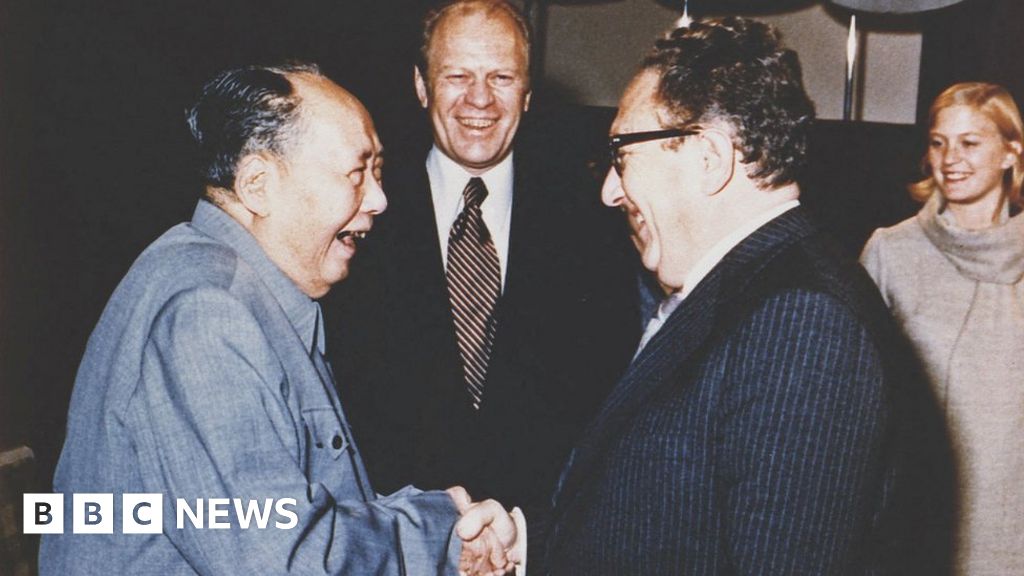
... While ties were " normalised" under President Jimmy Carter, it was his predecessor Richard Nixon who made that first, putting an end to decades of hostility...
Henry Kissinger: Divisive diplomat who towered over world affairs
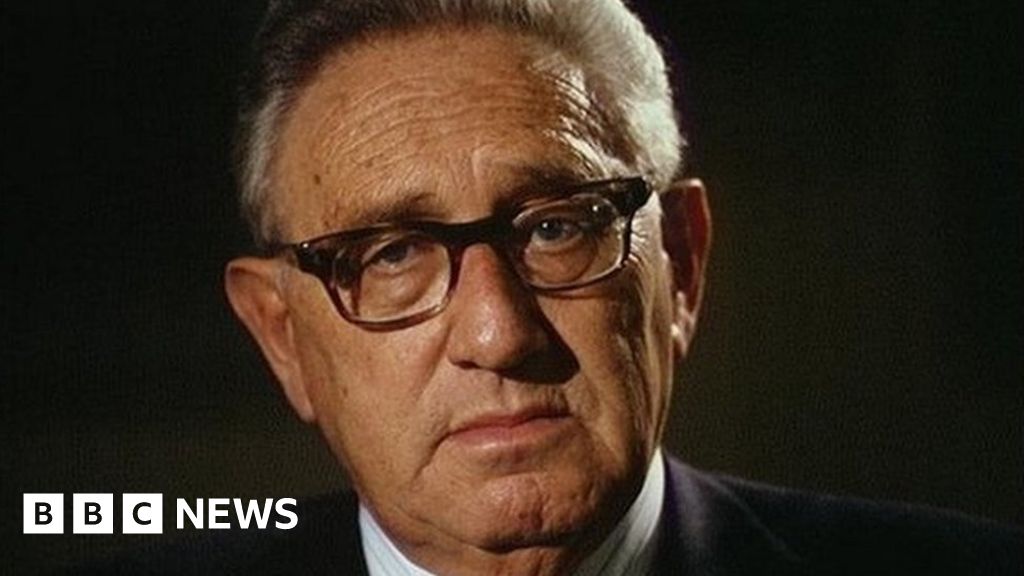
... He became a powerful critic of Jimmy Carter and Bill Clinton s foreign policy, arguing the presidents wanted too fast a leap towards peace in the Middle East...
US ex-President Jimmy Carter's wife Rosalynn dies aged 96
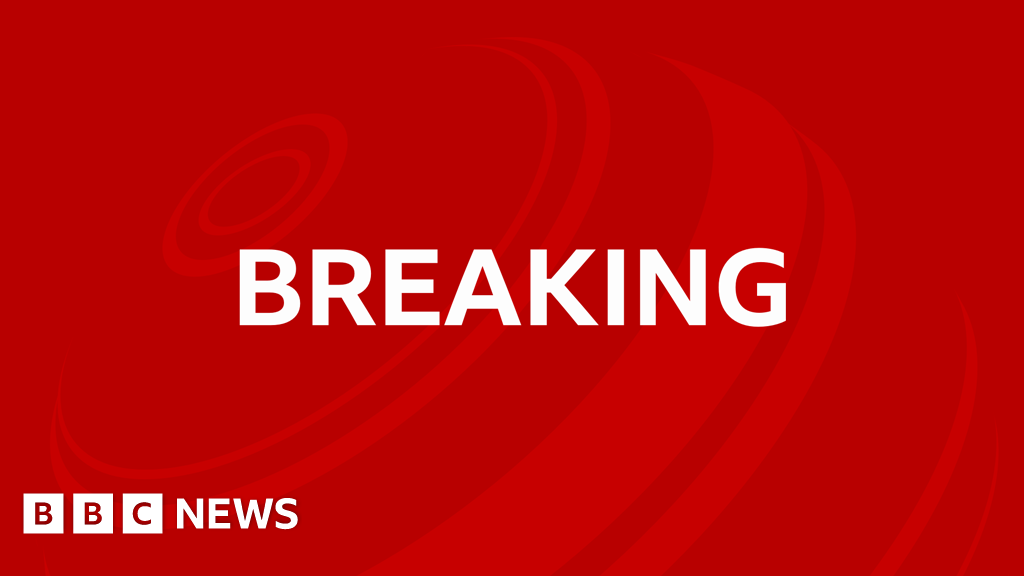
...The former US First Lady Rosalynn Carter, the wife of ex-President Jimmy Carter, has died at the age of 96...
Four surprises that could upend the 2024 US election
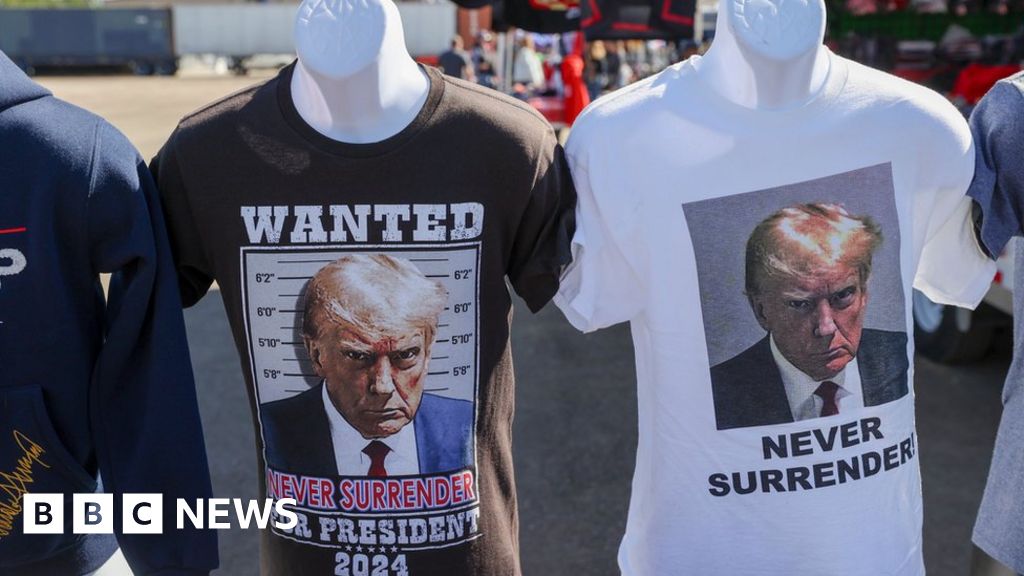
... In 1979, a hostage crisis arguably cost President Jimmy Carter re-election...
'The Cuban regime killed my father' - dissident's daughter
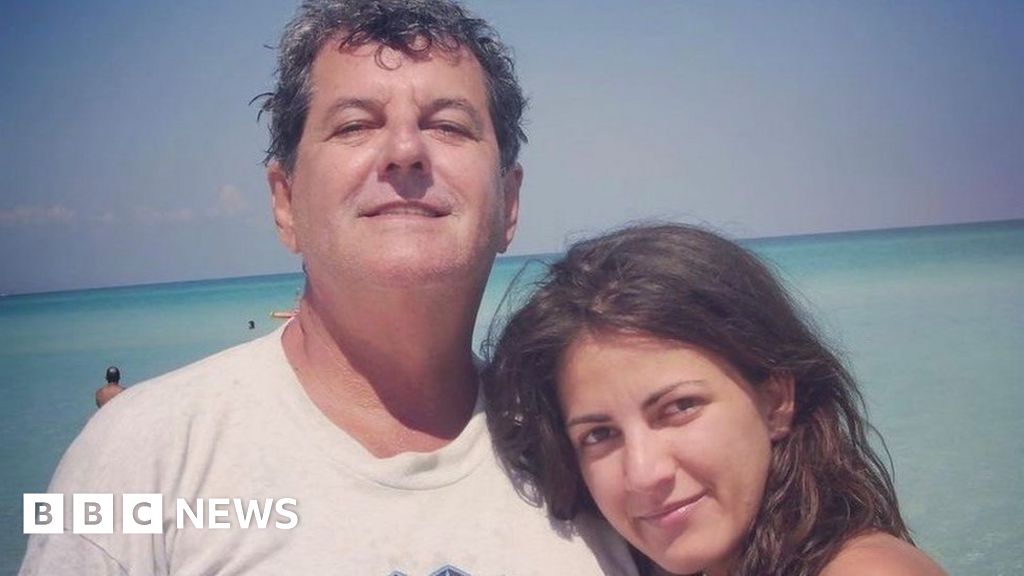
... That changed when former US President Jimmy Carter praised the Varela Project, in a speech he gave in Spanish at the University of Havana a few days later - in the presence of none other than Fidel Castro...
Former US First Lady Rosalynn Carter has dementia
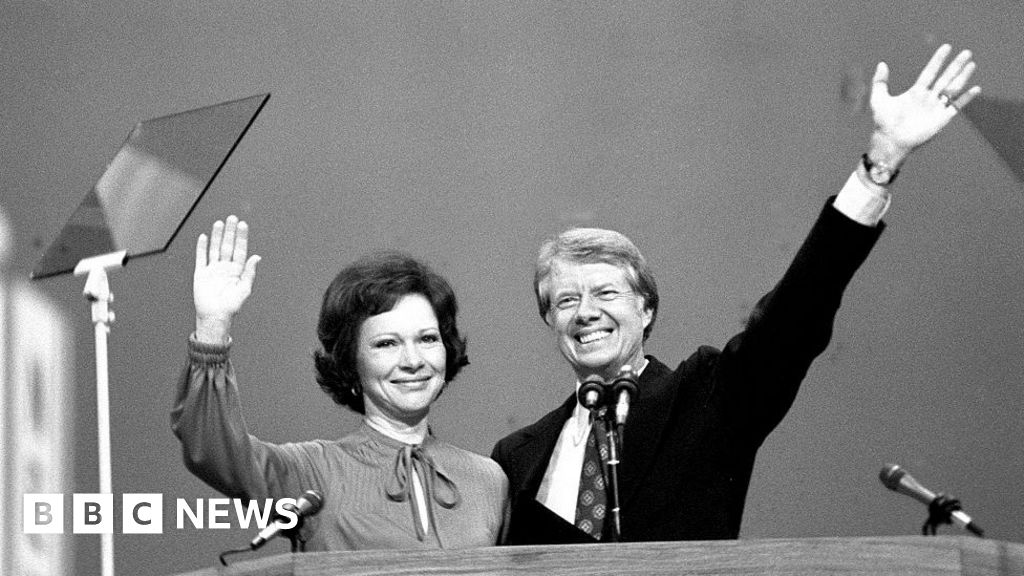
... The announcement comes as her husband, former President Jimmy Carter, receives hospice care at their home in Georgia...
Timeline: Why is America so interested in Northern Ireland?
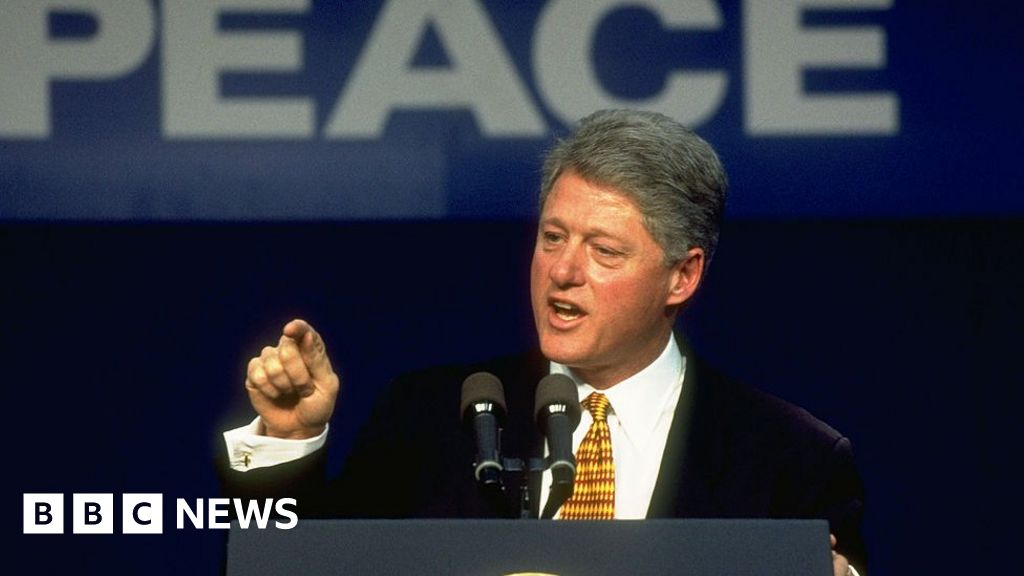
... Presidents Jimmy Carter and Ronald Reagan approached the issue sympathetically but mostly indirectly...
Former US President Jimmy Carter to receive hospice care
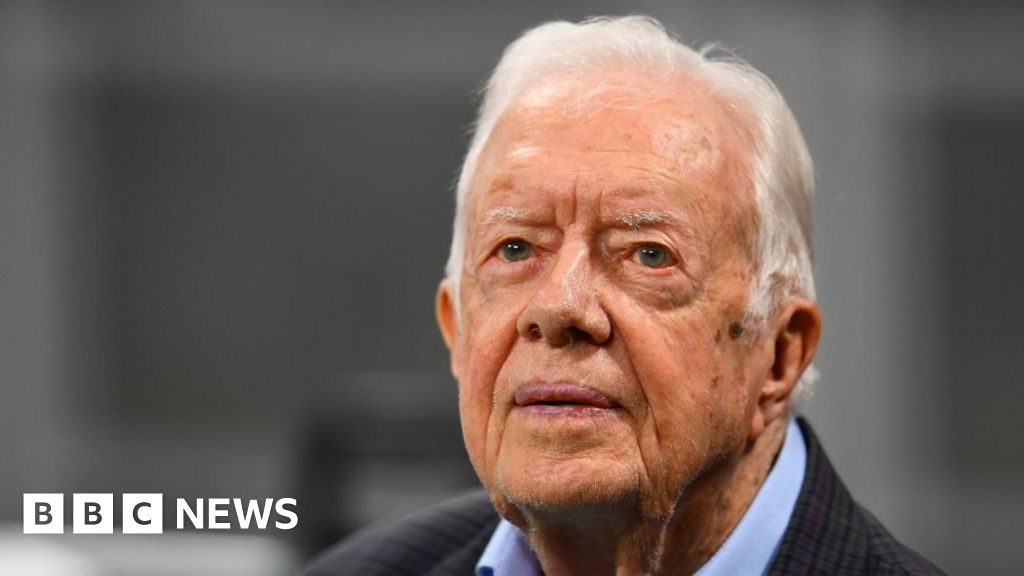
...Former US President Jimmy Carter will receive hospice care and " spend his remaining time at home with his family" instead of additional medical intervention, the Carter Center said...
Timeline: Why is America so interested in Northern Ireland?
By Matt FoxBBC News NI
On Tuesday night US President Joe Biden will fly into Northern Ireland for an official visit.
He will be The Fourth sitting US president to visit, following Bill Clinton , George W Bush and Barack Obama .
Recent negotiations over have been a matter of great interest in Washington.
But why would the United States have such a vested interest?
Peace, that's why.
During The Height of, US policy was somewhat on The Fence when it came to Northern Ireland .
Presidents Jimmy Carter and Ronald Reagan approached the issue sympathetically but mostly indirectly.
Things changed in 1992 when Mr Clinton pledged his allegiance to not only the US but Northern Ireland too.
With and President Biden's visit to The Island to mark the 25th anniversary of the Good Friday peace agreement, there remains a keen interest from America.
Here's a look back at that special relationship.
August 1977President Carter issues a statement supporting the establishment of a form of government in Northern Ireland but says his administration has " no intention of telling the parties how this might be achieved".
" The only permanent solution will come from The People who live there. There are no solutions that outsiders can impose, " he says.
1979Speaker of The House of Representatives, Thomas " Tip" O'Neill, publicly supports a ban on American arms sales to Northern Ireland 's police service The Royal Ulster Constabulary (RUC).
The UK had initially ordered 3,000 Magnum handguns and 500 semi-automatic rifles.
As a member of a group of pro-Irish unity American politicians, known as " The Four horsemen" O'Neill hopes the ban will prompt Prime Minister Margaret Thatcher to resolve The Conflict .
Despite a personal appeal from the Prime Minister when they meet in December, Mr Carter is unable to tackle Congress on the issue, with government papers later revealing he had pleaded with Mr O'Neill at Mrs Thatcher's request.
1980In May Mr O'Neill meets UK Foreign Secretary Lord Carrington and claims that his ban has been misinterpreted.
He suggests any arms deals with The Ruc will benefit The Ira as its supporters will stir up publicity for fundraising, in turn deepening The Conflict .
President-elect Ronald Reagan expresses his own thoughts on the arms ban, saying: " The US cannot interfere or intervene but if there is any way we can be helpful we would be More Than eager because I think it is a very tragic situation. "
1981In June Mr Reagan says The Situation in Northern Ireland " really bothers" him and he would give " serious thought" to intervening.
The Following month Taoiseach (Irish Prime Minister ) Garret Fitzgerald writes to Mr Reagan to ask for help preventing the death of Irish republican hunger striker Kieran Doherty .
Mr Reagan ultimately refuses to intervene but expresses his sorrow, adding his own personal feelings " are well known to The British government".
1983The US Congress passes a resolution in support of the New Ireland Forum and a united Ireland.
1985The UK and Irish governments seek the assistance of America in endorsing the. It gives The Republic of Ireland a consultative role in Northern Ireland for the First Time .
Mr Reagan obliges and publicly praises the initiative.
March 1986The House of Representatives unanimously votes to grant Northern Ireland a five-year $250m aid package.
1987-1994Diversity Immigrant Visas are launched by the US, benefitting More Than 52,000 Irish immigrants and strengthening ties between Dublin and Washington.
1992-1993Presidential hopeful Bill Clinton pledges A Number of commitments on Ireland during his election campaign, indicating he would support The Appointment of a special envoy to Northern Ireland .
In September 1993 The Ira observes a seven-day ceasefire to allow a group of prominent Irish-Americans to complete a fact-finding mission in Ireland, signalling a willingness to engage in The Peace process.
1994In January President Bill Clinton .
The decision is made against the advice of the UK government.
Later in the year The Ira 's leadership council indicates it Will Call a ceasefire but Only If republican Joe Cahill is granted a visa to enter the US and address The Group 's supporters there.
Due to his serious criminal record it takes The Intervention of President Clinton to authorise the document.
1995President Clinton appoints former senator George Mitchell as the inaugural US special envoy to Northern Ireland .
He would later prove hugely influential in securing the.
In March Mr Adams applies for another US visa, This Time to engage in fundraising activities.
The UK government's Northern Ireland Secretary Sir Patrick Mayhew and Foreign Secretary Douglas Hurd travel to the US, presenting their opposition.
The Visa is granted, a decision that is said to infuriate Prime Minister John Major .
During his visit Mr Adams visits a newly-opened Sinn Féin office in Washington Dc .
He is also received at the White House on St Patrick's Day after agreeing to place decommissioning of weapons on The Agenda for any further talks with the UK.
In November Mr Clinton travels to Belfast and Londonderry, becoming The First US president to visit Northern Ireland .
He is greeted by Protestants and Catholics in what is seen as a symbolic moment of The Peace process.
1996-1997While initially intended as an economic envoy for Northern Ireland , George Mitchell takes a hands-on approach at The Request of The British and Irish governments.
In a January 1996 report about weapons decommissioning the " Mitchell principles" are outlined - Six fundamental rules on which negotiations should be based.
They include a commitment to democratic and peaceful means of resolving political issues and the total disarmament of all paramilitary organisations.
April 1998The Good Friday Agreement is signed, The Talks process having been chaired by.
His skill in brokering the agreement, much of it done In Secret , earns him a reputation as a shrewd negotiator and someone who can be trusted by both sides.
The agreement sets up a new devolved government for Northern Ireland , in which unionists and nationalists will share power and outlines international agreements between the UK and Irish governments.
September 1998President Clinton addresses The People of Omagh, County Tyrone , Two Weeks after kills 29 people.
" We will work to build this peace, to make it a place where children can dream, to redeem The Loss of innocents from the madness of people who must fail so that your life can Go On , " he says.
September 1999Mr Mitchell returns to Northern Ireland , leading new negotiations on IRA disarmament and the establishment of a functioning assembly at Stormont.
The Trip is a successful one, with parties returning to government by November.
December 2000President Clinton makes a swansong visit to Ireland as he.
His trip concludes with a keynote address at The Odyssey Arena in Belfast, where he tells The Crowd how " profoundly important peace in Northern Ireland is to the rest of the world".
" I think you know that I have loved this land and love The Work I have tried to do for peace, " he adds.
2001Newly-elected President George W Bush calls on The Ira to disarm.
As tensions worsen during the in Belfast where hundreds of loyalist protesters tried to block the route taken by pupils and their parents, who were from a Catholic background, on their walk to school, Mr Bush dispatches a new special envoy Dr Richard Haass to help diffuse The Situation .
The newly-formed Police Service of Northern Ireland is invited to train alongside The Fbi .
2002The US names five paramilitary groups in Northern Ireland as illegal organisations: the Continuity IRA, the Loyalist Volunteer Force , the Orange Volunteers, the Red Hand Defenders and the Ulster Defence Association.
2003In April President Bush makes his first visit to Northern Ireland , calling for a " complete and irrevocable" end to paramilitary activity.
He meets Mr Blair and his Irish counterpart Mr Ahern at Hillsborough Castle in County Down .
Mitchell Reiss is appointed special envoy to Northern Ireland , serving until 2007.
2007Paula Dobriansky is appointed special envoy to Northern Ireland . She holds The Post until 2009.
2009Irish-born Declan Kelly is appointed as economic envoy to Northern Ireland by US Secretary of State Hillary Clinton .
Mr Kelly says that his role will be " confined to economic matters only and he would have no political function".
2013President Barack Obama makes his first official visit to Northern Ireland .
He addresses a gathering at the Waterfront Hall in Belfast ahead of the G8 summit in County Fermanagh .
He says Northern Ireland is " part of an island with which tens of millions of Americans share an eternal relationship".
" If there's one thing on which Democrats and Republicans In America wholeheartedly agree it's that we strongly support a peaceful and prosperous Northern Ireland . "
Later that year, with Stormont in deadlock, Dr Haass returns to Northern Ireland and says he will leave " no stone unturned" in an effort to reach an agreement with The Five main parties before Christmas.
Months of talks but Dr Haass says " significant progress" has been made.
2014With The Position laying vacant for three years, Gary Hart becomes The Second former senator to take on The Role of US envoy to Northern Ireland , serving until 2017.
2016In June the UK votes to leave the European Union , sparking The Beginning of years of negotiations about how Northern Ireland 's land border with The Republic of Ireland, and therefore the EU, will operate.
Meanwhile presidential hopeful Donald Trump hails the Brexit vote as " a great victory" telling The Bbc that the result was " a fantastic thing".
In November Donald Trump is elected as the 45th president of the United States , and from Stormont politicians.
2017Upon hearing of Mr Trump's intention to abolish the special envoy role, Gary Hart says it would be " a sad, even tragic decision".
He tells the Irish Times The Move " fits into a Trump pattern" and was " part of a much larger picture of disengagement internationally".
2019In June Mr Trump makes his first visit to The Republic of Ireland as US president and says the issue of the Irish border post-Brexit will " not be a problem at all".
During a press conference with Taoiseach Leo Varadkar , he says Americans " love the Irish" and that he believes things will Work Out well " with your wall, your border".
2020In March 2020 President Trump appoints Mick Mulvaney as the special envoy for Northern Ireland .
He visits once before his resignation in January 2021 following.
2021During talks with Prime Minster Boris Johnson in September, new US President Joe Biden warns that as a result of complications caused by Brexit.
He says he has concerns about the Irish border as concerns continue over the Northern Ireland Protocol, a trading arrangement negotiated during Brexit talks to prevent a hard border with Ireland.
2022In September the White House warns that dismantling the Northern Ireland Protocol will " not create a conducive environment" for US-UK trade talks.
Mr Biden repeatedly urges the UK not to take any action that could potentially create a hard Irish border.
In December Joe Kennedy III, something he describes as " an incredible honour".
The US State Department says he will concentrate on " advancing Economic Development and investment opportunities in Northern Ireland ".
Related TopicsSource of news: bbc.com

































